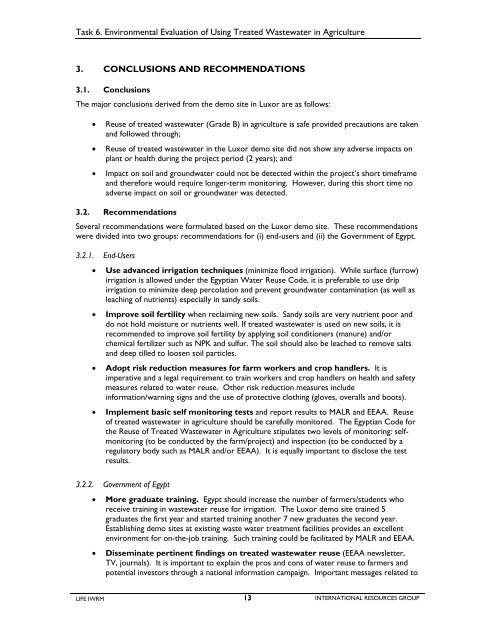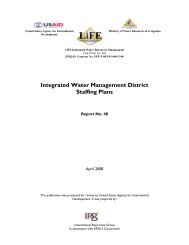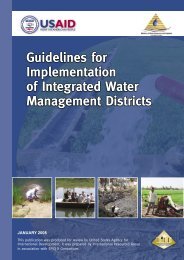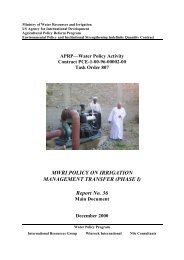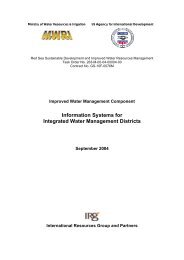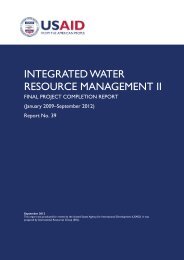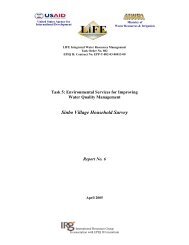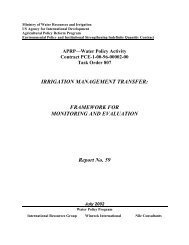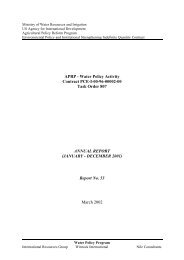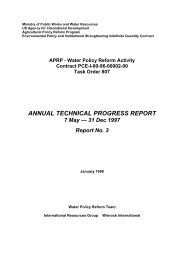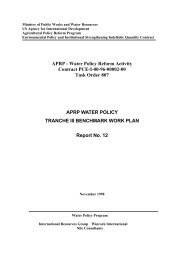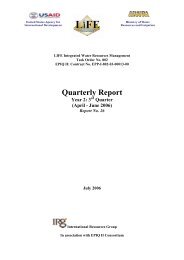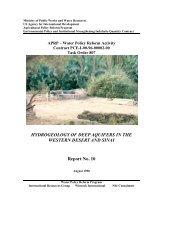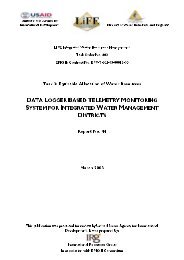Report 45 Task 6 Environmental Evaluation Luxor Demo Site
Report 45 Task 6 Environmental Evaluation Luxor Demo Site
Report 45 Task 6 Environmental Evaluation Luxor Demo Site
Create successful ePaper yourself
Turn your PDF publications into a flip-book with our unique Google optimized e-Paper software.
<strong>Task</strong> 6. <strong>Environmental</strong> <strong>Evaluation</strong> of Using Treated Wastewater in Agriculture<br />
3. CONCLUSIONS AND RECOMMENDATIONS<br />
3.1. Conclusions<br />
The major conclusions derived from the demo site in <strong>Luxor</strong> are as follows:<br />
• Reuse of treated wastewater (Grade B) in agriculture is safe provided precautions are taken<br />
and followed through;<br />
• Reuse of treated wastewater in the <strong>Luxor</strong> demo site did not show any adverse impacts on<br />
plant or health during the project period (2 years); and<br />
• Impact on soil and groundwater could not be detected within the project’s short timeframe<br />
and therefore would require longer-term monitoring. However, during this short time no<br />
adverse impact on soil or groundwater was detected.<br />
3.2. Recommendations<br />
Several recommendations were formulated based on the <strong>Luxor</strong> demo site. These recommendations<br />
were divided into two groups: recommendations for (i) end-users and (ii) the Government of Egypt.<br />
3.2.1. End-Users<br />
• Use advanced irrigation techniques (minimize flood irrigation). While surface (furrow)<br />
irrigation is allowed under the Egyptian Water Reuse Code, it is preferable to use drip<br />
irrigation to minimize deep percolation and prevent groundwater contamination (as well as<br />
leaching of nutrients) especially in sandy soils.<br />
• Improve soil fertility when reclaiming new soils. Sandy soils are very nutrient poor and<br />
do not hold moisture or nutrients well. If treated wastewater is used on new soils, it is<br />
recommended to improve soil fertility by applying soil conditioners (manure) and/or<br />
chemical fertilizer such as NPK and sulfur. The soil should also be leached to remove salts<br />
and deep tilled to loosen soil particles.<br />
• Adopt risk reduction measures for farm workers and crop handlers. It is<br />
imperative and a legal requirement to train workers and crop handlers on health and safety<br />
measures related to water reuse. Other risk reduction measures include<br />
information/warning signs and the use of protective clothing (gloves, overalls and boots).<br />
• Implement basic self monitoring tests and report results to MALR and EEAA. Reuse<br />
of treated wastewater in agriculture should be carefully monitored. The Egyptian Code for<br />
the Reuse of Treated Wastewater in Agriculture stipulates two levels of monitoring: selfmonitoring<br />
(to be conducted by the farm/project) and inspection (to be conducted by a<br />
regulatory body such as MALR and/or EEAA). It is equally important to disclose the test<br />
results.<br />
3.2.2. Government of Egypt<br />
• More graduate training. Egypt should increase the number of farmers/students who<br />
receive training in wastewater reuse for irrigation. The <strong>Luxor</strong> demo site trained 5<br />
graduates the first year and started training another 7 new graduates the second year.<br />
Establishing demo sites at existing waste water treatment facilities provides an excellent<br />
environment for on-the-job training. Such training could be facilitated by MALR and EEAA.<br />
• Disseminate pertinent findings on treated wastewater reuse (EEAA newsletter,<br />
TV, journals). It is important to explain the pros and cons of water reuse to farmers and<br />
potential investors through a national information campaign. Important messages related to<br />
LIFE IWRM 13<br />
INTERNATIONAL RESOURCES GROUP


